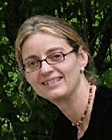UW service-learning project wins United Nations award
An award from the United Nations is honoring the work of Araceli Alonso, a senior lecturer in Gender and Women’s Studies and a faculty associate at the School of Medicine and Public Health at the University of Wisconsin–Madison.
The United Nations Entity for Gender Equality and the Empowerment of Women recently notified Alonso that she is the recipient of the 2013 United Nations Public Service Award for Gender, Health and Development for her service-learning project, Health by Motorbike. The award will be formally announced on United Nations Public Service Day on June 23, 2013.
Alonso developed Health by Motorbike after visiting Kenya in 2009. While talking to women in several villages, she learned that many had basic questions about women’s health, suffered from illnesses easily preventable with basic health care and knowledge, and lived more than 40 miles from the nearest medical facilities. Among other services, the project brings public health nurses to remote villages by motorbike to provide health education.

Araceli Alonso
Alonso has also created a service-learning aspect of Health by Motorbike. UW students attend training on campus, then travel to Kenya and pass their knowledge along to women in the villages during intense summer camps. In place since summer 2010, the service-learning project is designed to teach the villagers how to sustain the health projects on their own.
“This award has proven to me that there is a hidden and powerful synergy in the universe, and that collaboration, knowledge, sharing, compassion, empathy and willpower go way further than financial resources,” Alonso says.
“We are exceptionally pleased that Dr. Alonso received this recognition,” says Nancy Mathews, director of UW–Madison’s Morgridge Center for Public Service, which has provided funding for the project along with the Ira and Ineva Reilly Baldwin Wisconsin Idea Endowment and the Global Health Institute. “Her work empowers women and ensures that that health care services, as well as information, reaches members of remote Masai communities in Kenya.”
Parts of the Health by Motorbike model will soon be replicated in eleven countries of the Great Lakes of Africa, and the entire model will be replicated in some of the most isolated indigenous communities of Guatemala.
–Carrie Anton




